Paul Kent: Brash Panthers out to fracture Rabbitohs’ fairytale in NRL Grand Final
Penrith’s brash young team will relish playing the bad guy role as Wayne Bennett’s Rabbitohs chase a fairytale finish in the NRL grand final, writes PAUL KENT.
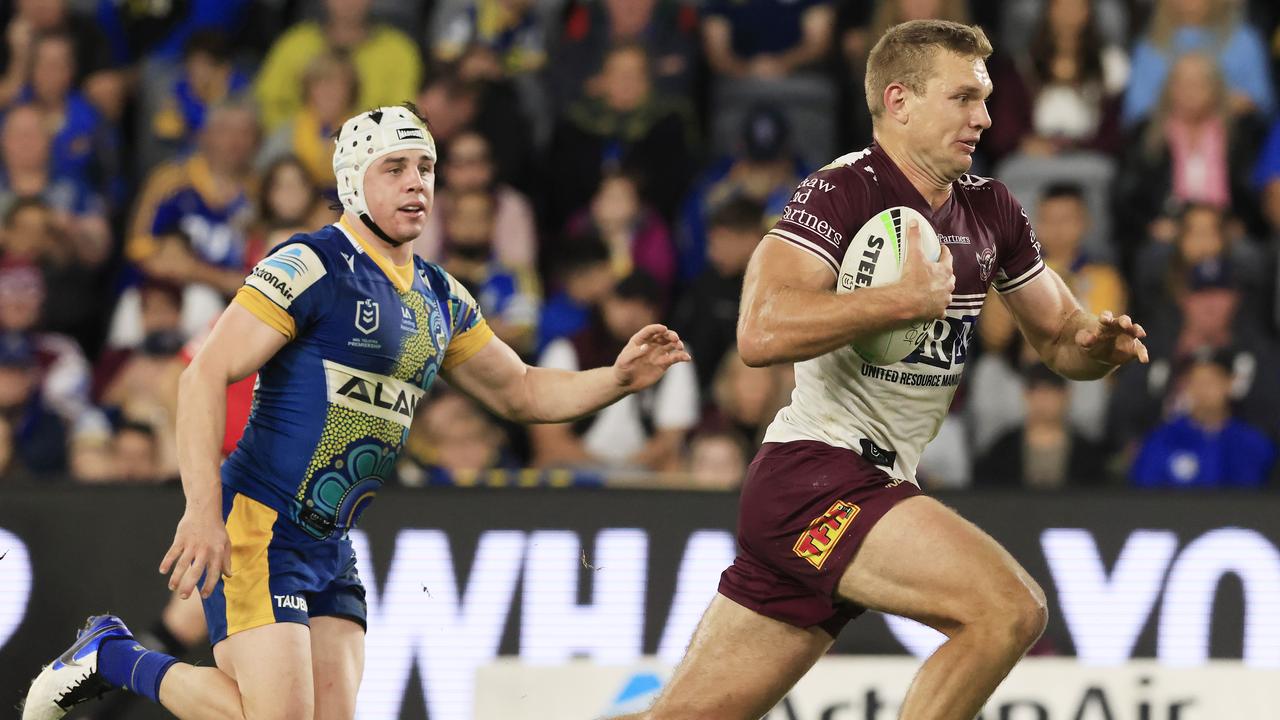
NRL
Don't miss out on the headlines from NRL. Followed categories will be added to My News.
Sometimes, Cinderella misses the ball, the nice guy doesn’t end up with the girl, the bomb disposal expert cuts the red wire when he should have cut the blue wire, the batter strikes out in the bottom of the ninth.
As the great philosopher Sonny Liston once said, while tossing a banana peel at this fairytale vision of sport we hold so dear: “A prizefight is like a cowboy movie. There has to be a good guy and a bad guy. People pays their money to see me lose. Only, in my cowboy movie, the bad guy always wins.”
And come Sunday, the Penrith Panthers are ready to toss a poisoned apple at the South Sydney fairytale.
Watch Fox Leagues’s massive line-up of Grand Final week coverage on Kayo including live pre-game, halftime and post-game coverage with full analysis from the best team in the business. New to Kayo? Start your free trial >
All week the narrative has been skewed, the scriptwriters almost urging the result to go only one way. For one, it makes the writing a hell of a lot easier.
So the misty eyes have been celebrating Wayne Bennett’s extraordinary ability to set a team for a grand final, Adam Reynolds’ farewell, Benji Marshall’s resurrection.
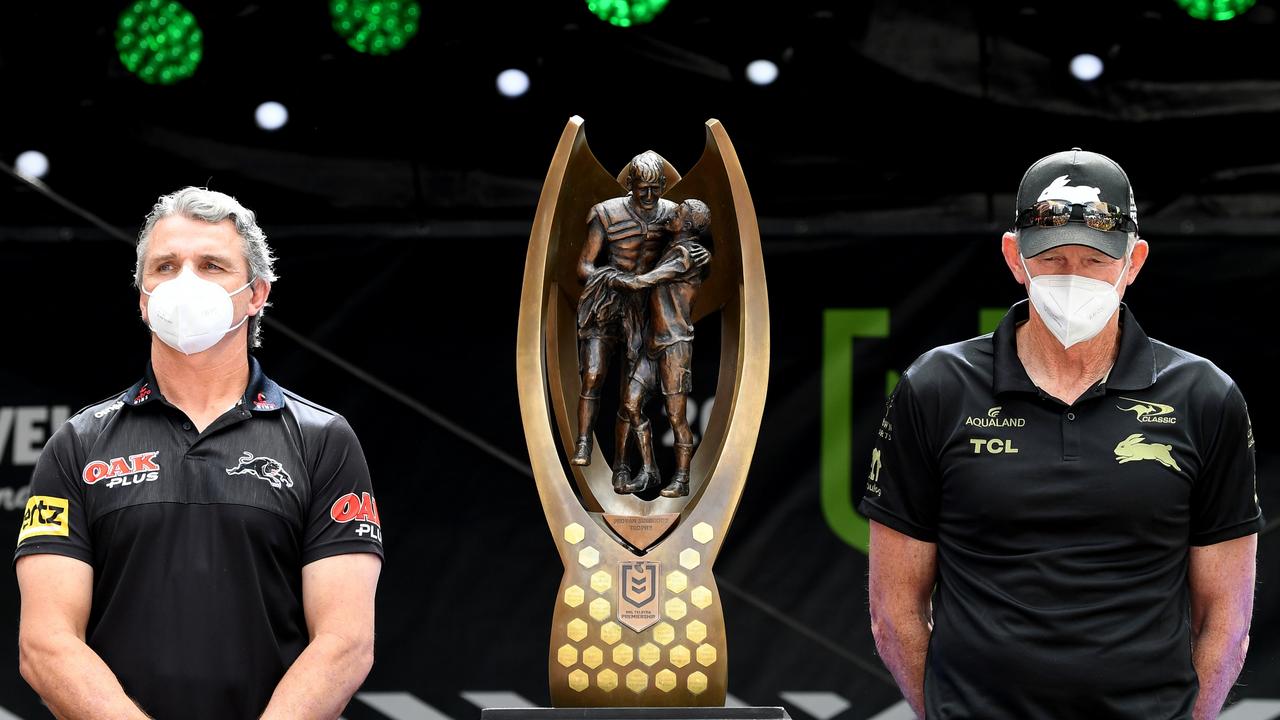
The prose has been particularly purple.
About the only thing Bennett has not been accused of doing this week is turning water into wine, which would be a wasted talent as Bennett is a well-known teetotaller.
The rest of us might feel differently.
Reynolds, the local junior who grew up kicking the footy at signposts along the streets of Redfern, plays his last game for South Sydney after the club bizarrely decided to release him, so most believe it only fitting that Reynolds exits with a premiership. He deserves nothing less.
Across the dressing room Marshall’s journey tugs at more than a few heartstrings. Most recognise the symmetry of Benji blazing to a premiership an astonishing 16 years ago — all that talent bundled into a bad haircut — and now reappearing completely rebuilt as the wily veteran.
Marshall’s story would be complete with a premiership on Sunday.
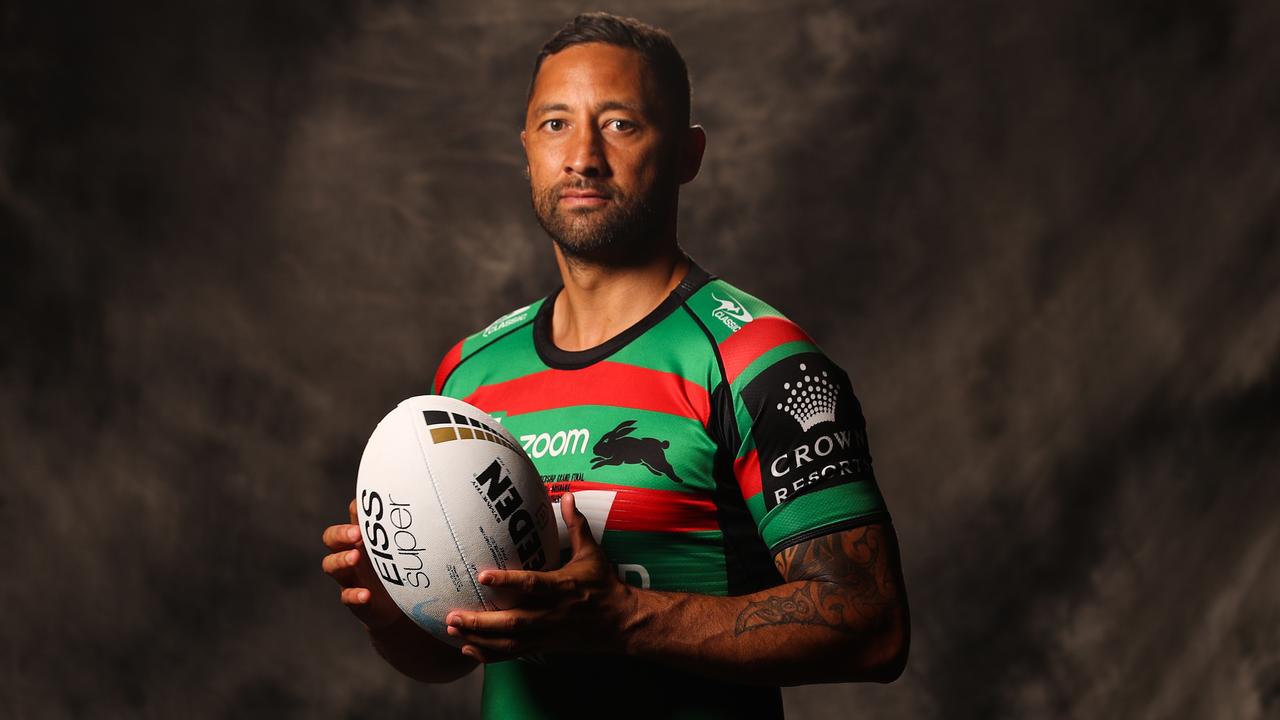
Yet up against them, wearing Sonny Liston’s black hat, will be the Panthers.
They are cocky and brash and not to everybody’s taste.
There is a lot to admire about the Panthers, and some things hard to like.
The report back from last week’s win over Melbourne was that the Penrith bench was absolutely scathing towards the Storm players throughout the game, to the point it crossed the line by several good metres.
When Brandon Smith left the field carrying a busted shoulder the Panthers’ bench called him all kinds of adjectives not fit for print and it appeared to most they had overstepped the boundaries of good sportsmanship.
The backstory to their verbal assault, though, was some Melbourne players mocking them after last year’s grand final by ridiculing Penrith, Mt Druitt and any other suburb they had come from.
The Panthers took it personally and so replied in kind.
Through their sins, though, and their response to them, we can see the development of a footy team that is primed for success.
They push the rules, taking advantage of the NRL’s weakness to enforce its own standards like only a few clubs have done before them.
They are young and brash and unapologetic about who they are.
Like few can do, the Panthers have taken all the insults and turned them into a strength.
They’re from Penrith, and proud of it.
It takes an enormous strength of character to do what the Panthers have done, even more so given their collective youth.
And it will take all that and possibly more to finish the job on Sunday.
A great part of their narrative this week, which has varied none of the rose-coloured stories the Rabbitohs are inspiring, is that Penrith are hoping to prove true the old adage that you have to lose one to win one.
There is not much else they would say after losing last year’s decider.
The adage is something of a furphy, though.
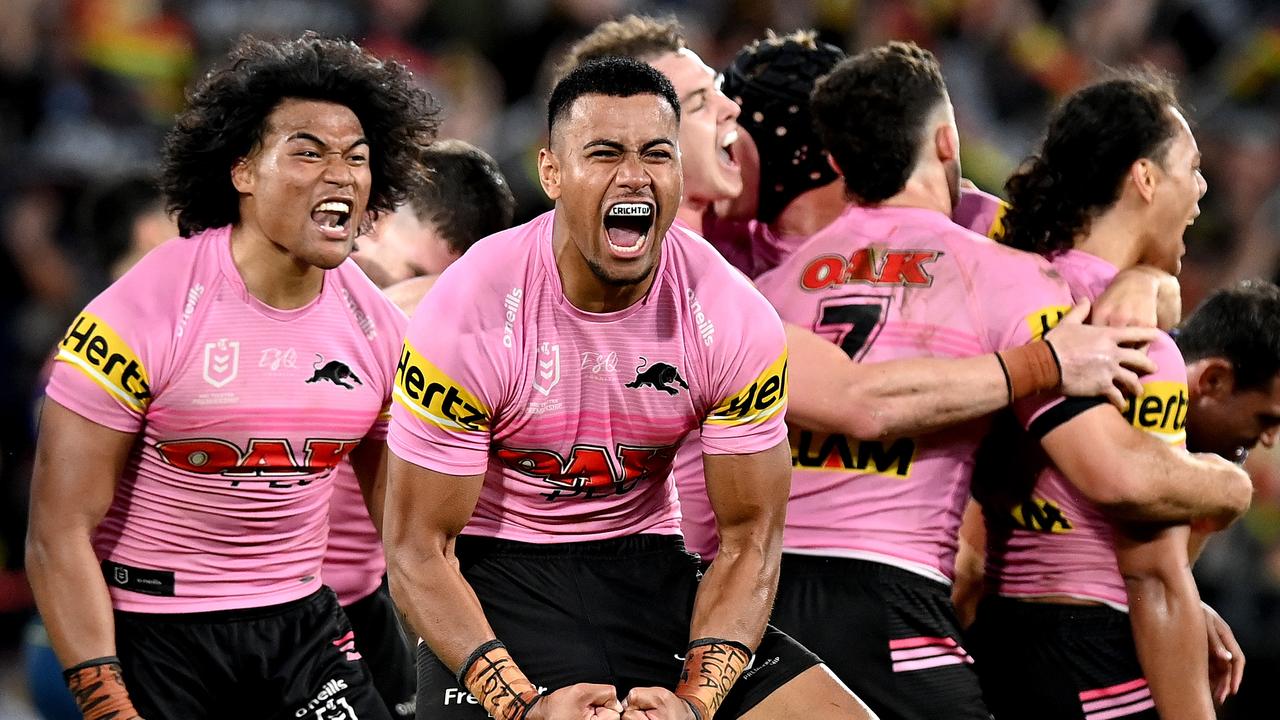
In the past 50 years only four clubs have won a grand final after losing it the year before, although Canterbury and Melbourne did it twice.
The Bulldogs lost in 1979 and won in 1980 and did it again in 1994 (loss) and 1995 (win).
Melbourne lost in 2006 and won it in 2007 and did it again in 2016 (loss) and 2017 (win). The only other teams to do it were Penrith in 1990 (loss) and 1991 (win) and Manly in 2007 (loss) and 2008 (win).
The reality is that teams getting back to the grand final are as much a chance to lose again.
Parramatta lost grand finals in 1976-77, Manly in 1982-83, Balmain in 1988-89 and St George in 1992-93. The Sydney Roosters lost in successive seasons, 2003-04, but won it in 2002 to kick start their run.
While statistics can be twisted to show anything you like, what is telling is that none of those teams really recovered to go on and win a premiership at some later date.
While the Eels did get home in 1981, and Manly in 1987, both in relatively short turnarounds from grand final defeat, both squads had undertaken major overhauls, while Balmain and the Saints never got there at all.
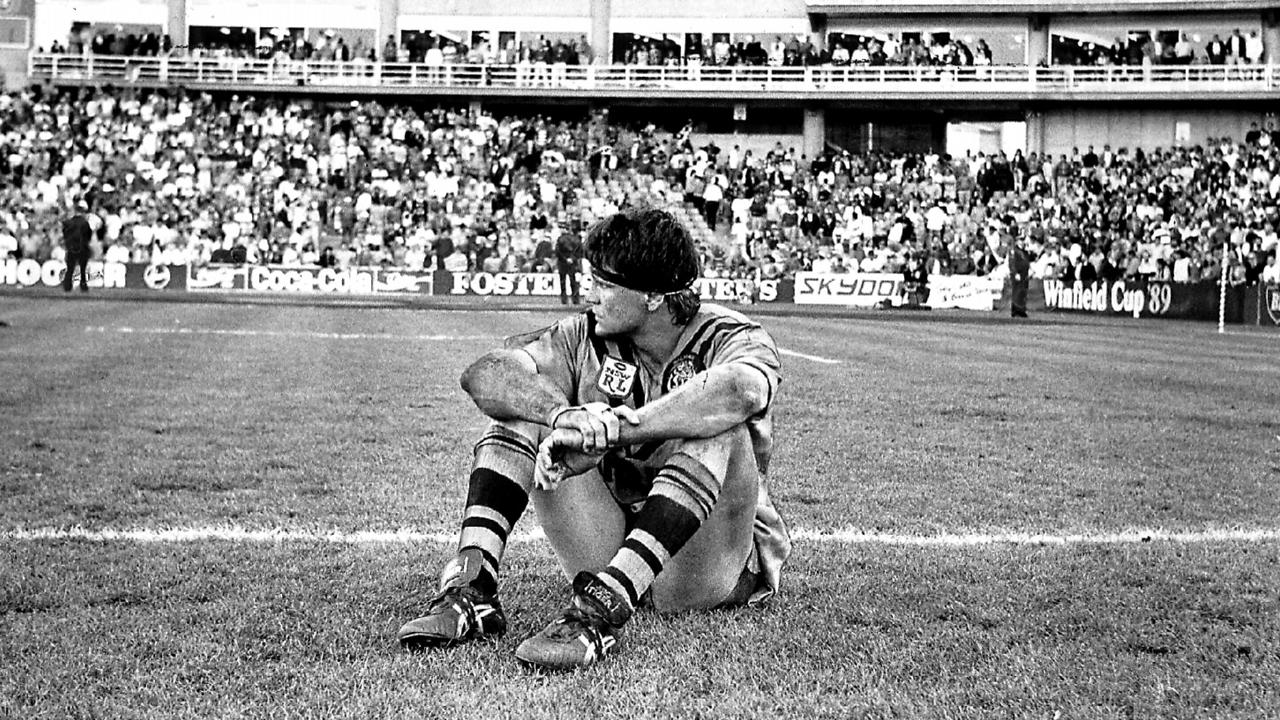
In every case it proved too much for them.
Perhaps the most famous were the Tigers in 1988-89, raging favourites in their second attempt, only to famously lose to Canberra in extra time.
Gamely, they tried to get themselves up for a third run at a premiership. They could not do it.
The Tigers finished equal fifth, survived a playoff, but went out in the first week of the finals.
After successive grand final defeats they found it too hard to climb the mountain a third time.
After that season coach Warren Ryan walked away. He was asked why.
“All the juice has been squeezed from the lemon,” he said, and he was right.
These Panthers are young and the salary cap will bite again and force Ivan Cleary to begin turning over his squad.
But their happily ever after can begin on Sunday.
LEGEND’S LESSON FOR NRL STARS
Some years back New York Yankees shortstop Derek Jeter retired after 20 seasons in the Major Leagues without smudge or scandal to mark his name.
It was one of the great careers in modern baseball and Jeter remains a highly popular figure across American sports. The story, as it was relayed here, was that Jeter had a basket placed just inside his front door for one very specific purpose.
Everybody that entered his penthouse apartment must put their mobile phone in the basket and leave it there until they collected it on their way out.
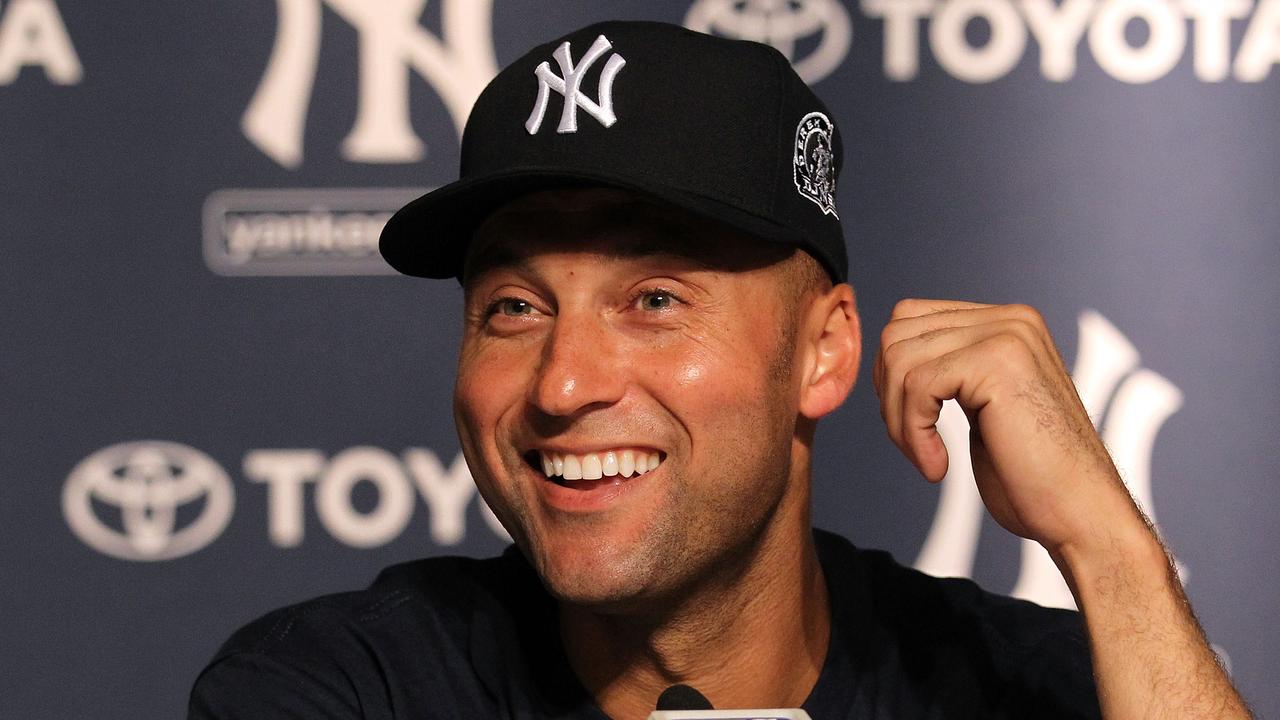
And so, in 20 years as one of America’s most celebrated athletes, Jeter never had one scandal attached to his name even though he dated a variety of models, singers and actresses and had any number of celebrities walk in and out that front door.
Who knows what happened inside? Nobody, because nobody was there to film it.
It’s a lesson more than a few NRL players could learn at the moment.
How the video showing Cameron Munster and Brandon Smith got out is easy to see and happens far too often.
A basket inside the door would not have stopped what happened inside, and that is their business, but it certainly would have saved some trouble.
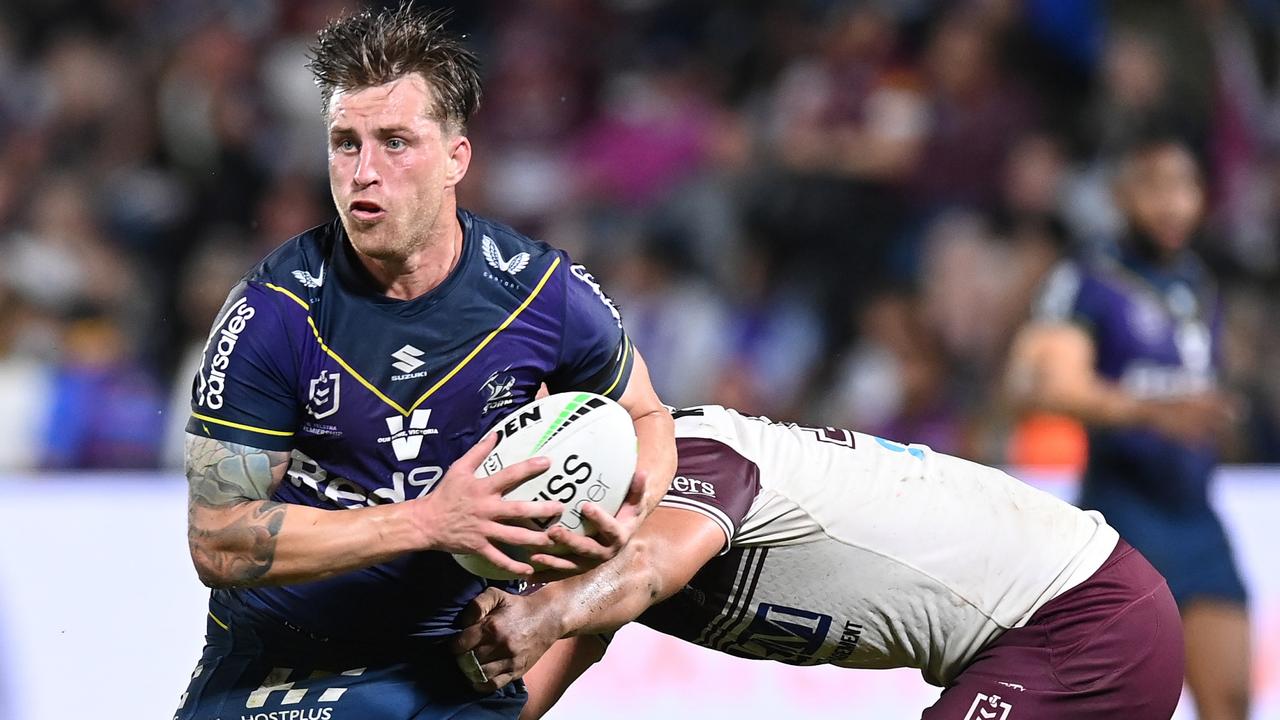
WHY 50-POINT MYTH DOESN’T RATTLE SOUTHS
When it was put to Wayne Bennett last week that Manly coach Des Hasler had never lost a preliminary final as either a player or coach, Hasler sitting atop an impressive 8-0 record, the unimpressed Bennett performed what passed as a curl of the lip.
“That’s a bit of a myth stat, that one,” he growled.
Bennett dropped the stat on the floor and twisted his toe on it, like a dirty cigarette. He was right, naturally. Some statistics are simply natural quirks, like this one seemed to be, while others can come more by way of good luck more than good management.
The first in today’s sermon goes that no team has ever won a grand final after conceding 50 points in a game during the season.
That is what Bennett must deal with.
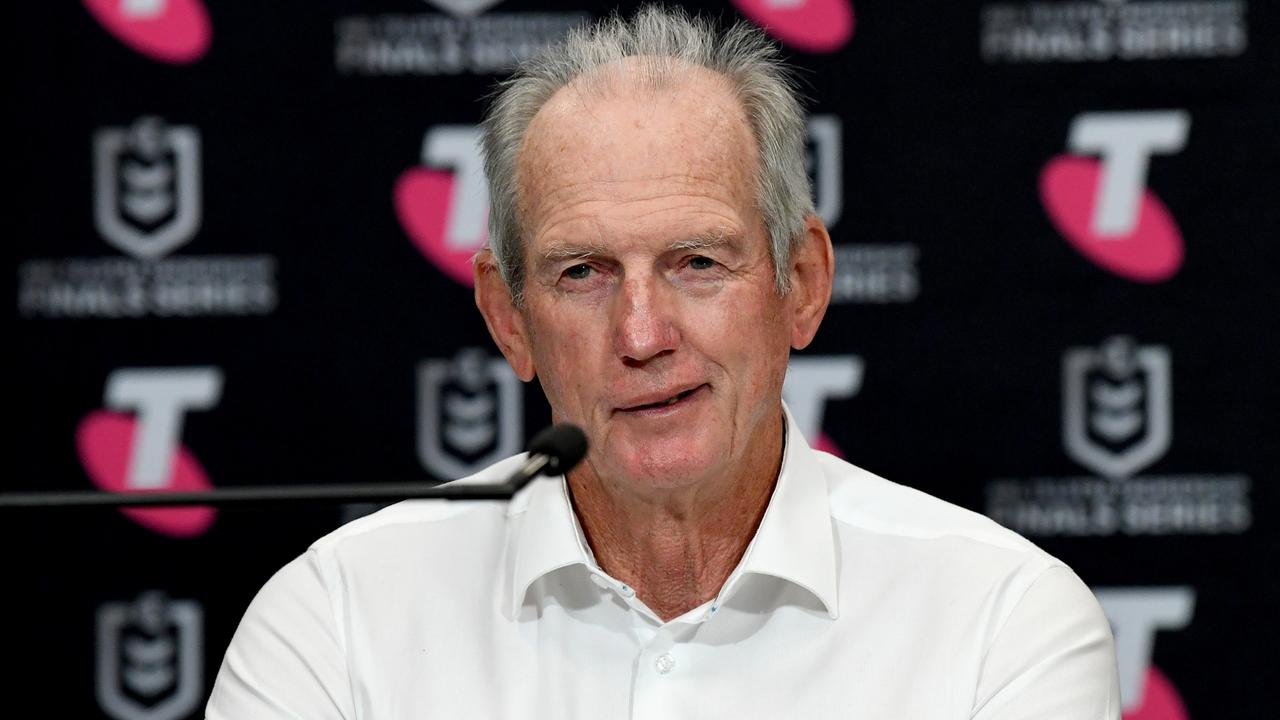
The second goes that if a coach passes the 250 games mark and has not already coached his team to a premiership, then he will never do it.
This is what Cleary must deal with.
Either way, it means that this week, as they like to say when two undefeated heavyweights finally get in the ring together, the “O” must go.
Either the 50-point rock crumbles or the 250-game barrier melts away.
The underlying reality in the 50-point statistic is that defence usually wins the big games and any team conceding 50 points is simply not up to it.
The most ever conceded in a premiership season was Newcastle’s 49 points in 2001, who countered that with the genius of Andrew Johns.
Credit to Bennett, he was never concerned when Souths twice got beat by 50-point scorelines earlier this season.
It happened first against Melbourne in a 50-0 round nine loss and then again against Penrith in a 56-12 loss in Dubbo.
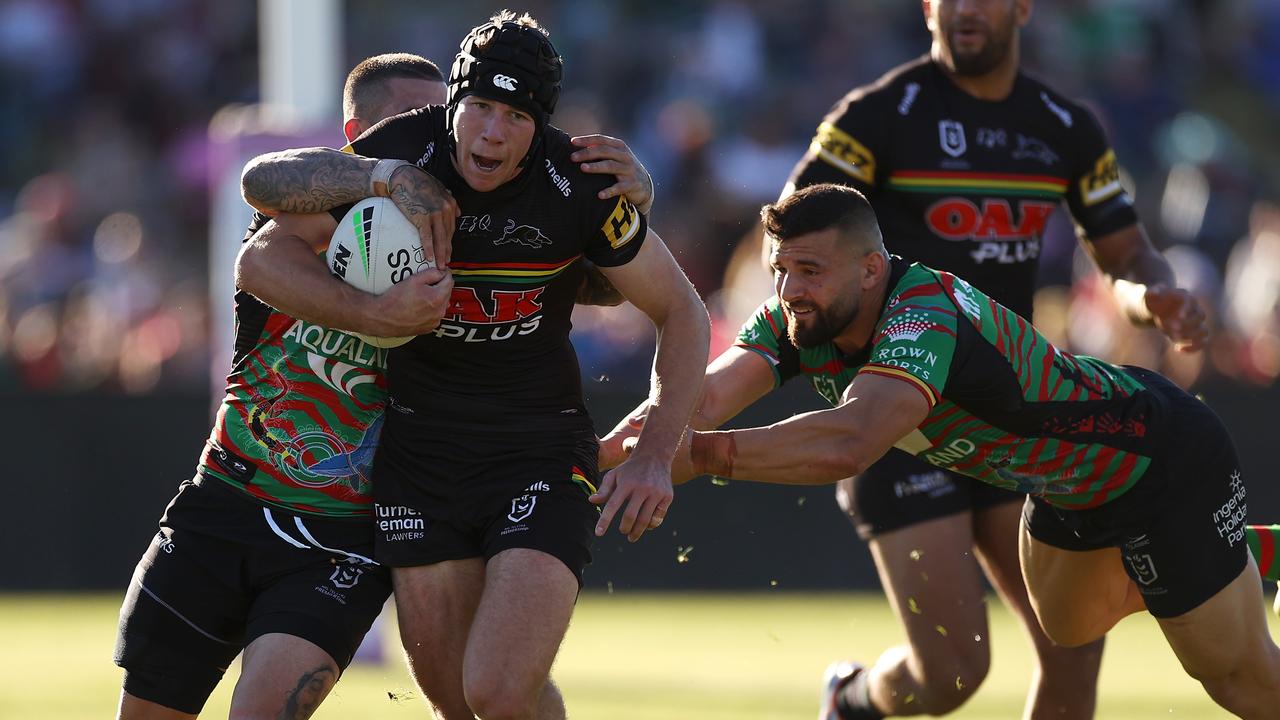
What few realise is that since then the Rabbitohs have tightened their defence considerably and are averaging just 15.4 points against them since that Penrith loss, which is important only because one of Bennett’s time-tested rules to win a premiership is that a team can average no more than 16 points a game against and win a premiership.
There lies the confidence behind the smirk, and they will write into it what they will.
Bennett, in his 10th grand final, has reached that fortunate position that whatever he does this week will be written into the mythology around him.
He says nothing, and the Bennett myth makers will read into his silence a great depth, the Super Coach unprepared to share his wisdom.
If he speaks, they will interpret his words to promote the legend. Either he is schooling Cleary, or playing mind games with Penrith, or taking the pressure off his team by making it about him.
Pick a narrative that suits.
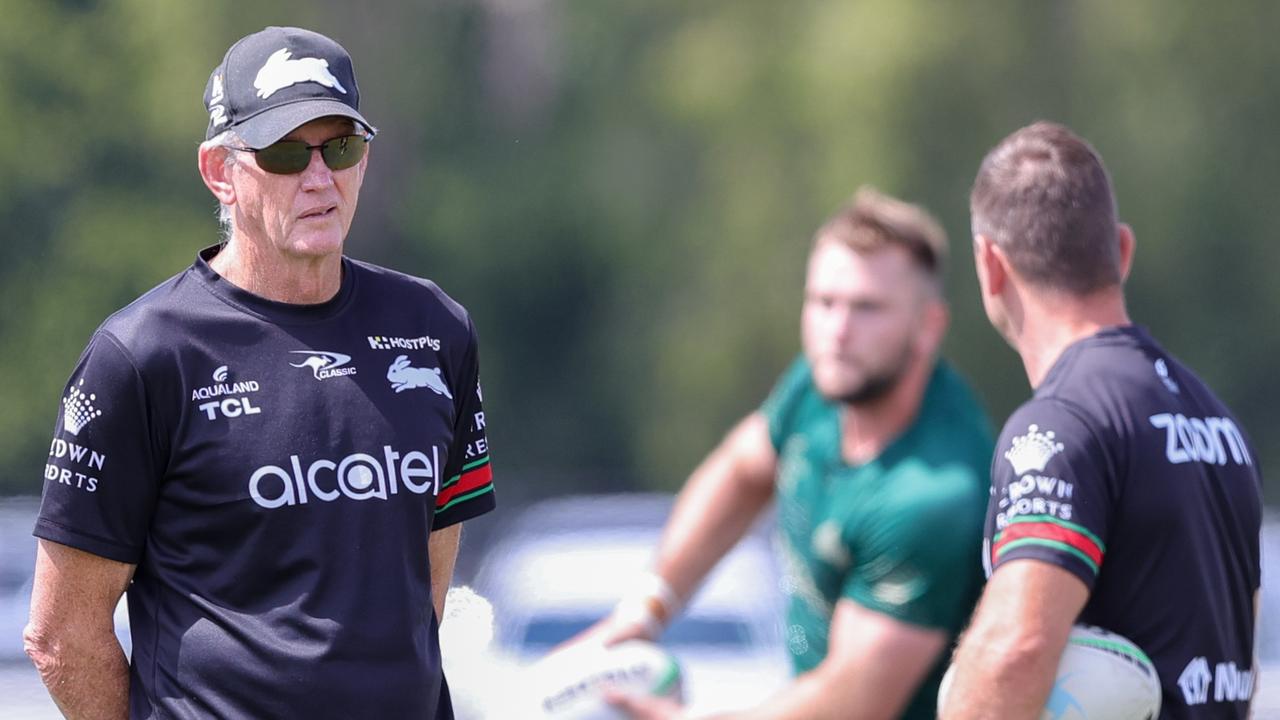
Mankind has been in the god-making business for centuries, beginning with small gold statues of men standing on mountains, so no need to stop now.
Bennett understands this power better than most. He smiles nowadays and it sparks an 800-word column full of interpretation or, just as often, provided off the record.
Already this has emerged as the underlying narrative between him and Cleary this week, with the myth makers interpreting every Bennett smirk as more evidence of him getting one over Cleary.
It comes after tensions flared three weeks ago when it was leaked in the media that Bennett had complained to the NRL about Penrith’s illegal blockers in a bid to put pressure on Penrith’s kicking game.
In the ultimate double play, Bennett’s supporters remain convinced it was actually Cleary who leaked it, to complain about coaches pressuring referees, and that the greatness of Bennett was that he turned it back on Cleary.
Regrettably Cleary then fell for the old two-card trick by bringing it up in the press conference after the Panthers lost, saying the game should stop coaches from pressuring referees ahead of games.
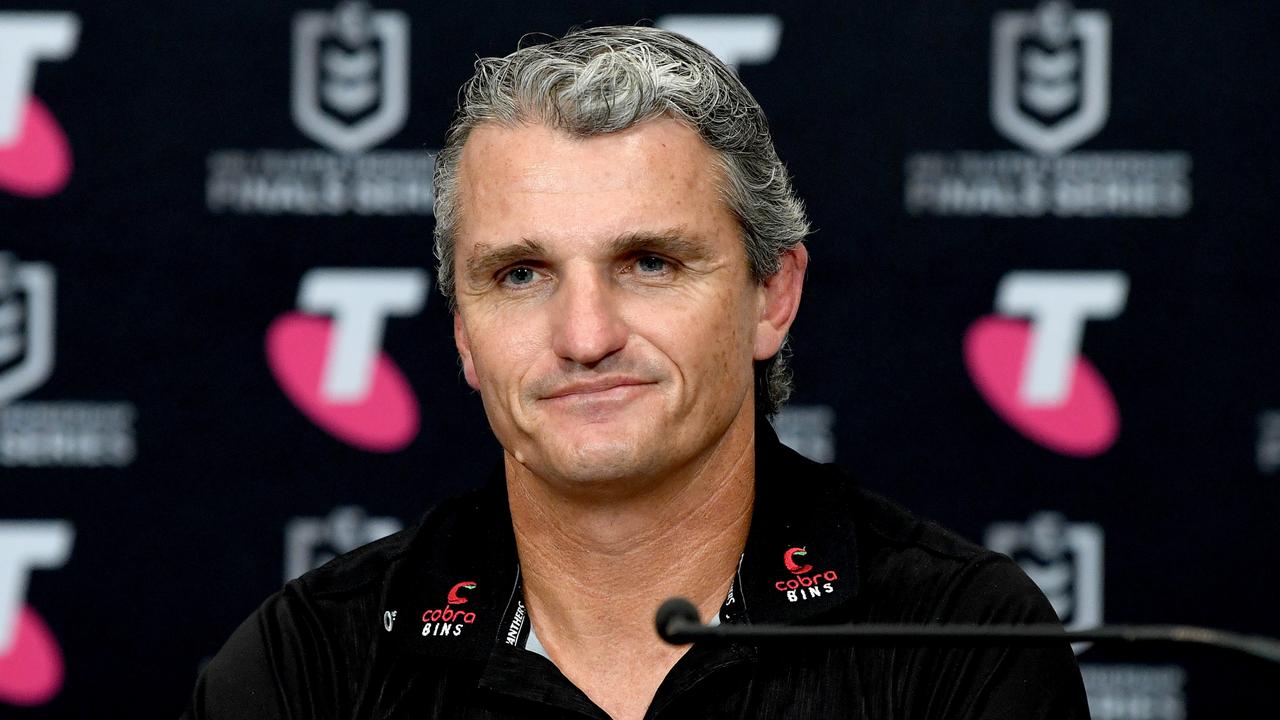
Bennett, with the clear advantage given he was coming in second, had only part of what Cleary said reported back to him and so teed off, saying he was only defending himself against Cleary’s accusations.
The exchange only added to the Bennett mythology.
Cleary has his own struggles this week.
His team is injured and to what extent nobody is sure, but they certainly appear more wounded than the Rabbitohs.
On top of that Cleary is currently the second longest-term coach without a premiership, a weight that grows each day this week.
Sunday’s grand final will be his 370th game as coach. Only Brian Smith sits higher, with an Everest-like 601 games coached without premiership success.
Cleary has already surpassed Matt Elliott (265 games), Nathan Brown (269 games and still counting) and Graham Murray (331 games) without coaching a premiership.
Only he and Murray are in the coaching top 20 list of games coached without a premiership.
The 250-game mark was set by John Lang, who so far has waited the longest for premiership success when he coached Penrith to the title in 2003 after 249 games.
Truth is Cleary’s chances of overcoming it will have less to do with Bennett than it does with how he freshens his team for Sunday’s decider, which he has already turned his focus to.
Not that the myth-makers will be content with that.
“I’ll be doing what I’m good at and staying in the background,” Cleary said after qualifying, when Bennett and a resumption of hostilities was raised.
Ooh, said the myth makers, Wayne has already got under his skin.
GLORIOUS TRUTH ABOUT SOUTHS’ ULTIMATE VICTORY SONG
The son rings his father …
“Dad,” he says.
“Yeah?”
“How are you, you good?”
“Yeah, good.”
“Remember when I spoke to you on the phone about the Rabbitohs’ victory song? The South Sydney victory song? Everyone thinks it’s ‘Glory, Glory’ but that’s actually not the true victory song, is it?”
“No,” says the father, “it’s ‘Now That We’re All Around The Bar’.”
“So can you sing it for me?” says the son.
Scott Sattler shares some audio of his father's beautiful rendition of the South Sydney Victory Song.
— 1170 SEN Sydney (@1170sen) September 24, 2021
Via @SportsdayNSW#NRLpic.twitter.com/g8VOm3l3Gc
And with that Johnny Sattler, Rabbitohs’ royalty, breaks into a song only ever sung after a South Sydney premiership win.
“And now that we’re all around the bar,” he starts.
“And the captain’s declared it a quorum,
“We’re drinking our way through the night,
“And we’re having the time of our lives.
“Throw the empties away, start again,
“For the boys of South Sydney are together …”
The phone call happened last week when Scott rang his dad and did not tell him that he was recording it for his radio show, nightly on SEN, and it simply appeared a private moment between father and son, but one shared for us all.
Scott grew up around that song.

As a boy he would wake hearing his father singing it at home. As he got older and he woke in the pub where they lived he would look for his father and find him cleaning the bar, singing the song.
It is an echo of his childhood, and now he has it on tape.
“It’s nice to have,” Scott says.
“Whether he is here with us for 12 months or 20 years I’ll never know, but at least I’ve got something in the archive that I can always go back to.”
There is a nice symmetry around Sunday’s grand final.
John Sattler created a grand final moment forever in 1970 when, with half a Rabbitoh on his chest, he broke his jaw early in the game against Manly and climbed to his feet and pushed his jaw back into place and took his position again.
He figured out if he bit down on his mouthguard he could keep the jaw in place and so the rest of his game was played through gritted teeth.
And then when full-time sounded and his Rabbitohs teammates lifted him on their shoulders and chaired him from the field, his face now swollen and misshapen.
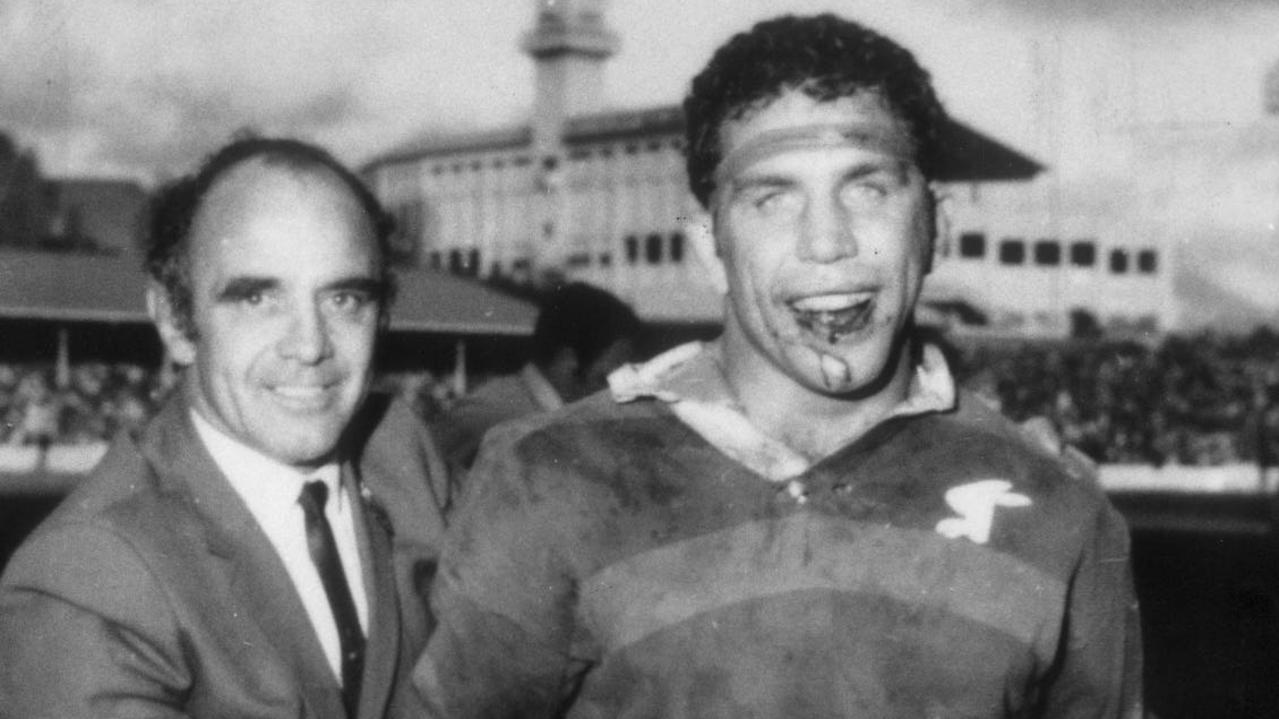
And when they got in the SCG change rooms after that they broke into song, their victory song for after grand finals.
Scott, now 49, was not born at the time. But in 2003 when his own career was nearing its end he ran out for Penrith as heavy underdogs against the Sydney Roosters and, in one of those moments that convinces you somebody is looking over us all, Todd Byrne broke clear down the left wing and it all came down to this and Scott headed across the field and cut him down, saving the game for Penrith.
He found his own grand final moment in that.
And now that their two clubs face each other on Sunday there has been a push in some quarters for the NRL to include John and Scott somewhere in this week’s presentation ceremonies.
Scott is unsure. He respects the sentiment but does not want to push for it, as much as anything else because he is aware it would take some convincing now.
Life has changed significantly for John Sattler in recent years.
He now lives in a retirement village on the Gold Coast, suffering dementia.
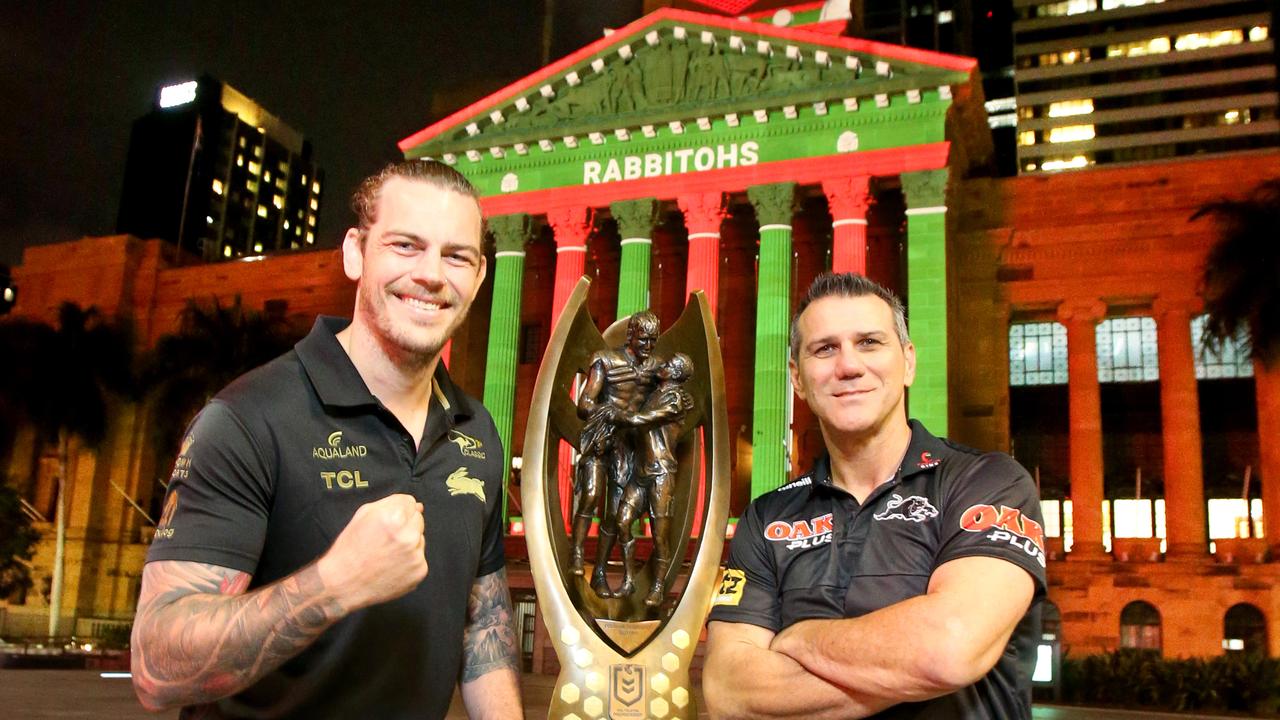
There are days he cannot remember his breakfast, what he ate or whether he even had it.
And while it is a retirement home, and he is happy living there, he must be signed in and signed out because nobody is sure how well he is on any particular day.
The dementia has done what only it can do to the best of us, which is strip the confidence from a man who was once a giant.
So much, John Sattler, 79, rarely goes out in public any more.
“He gets really nervous being around crowds now,” Scott says.
Scott believes it would take too great a toll for him to be at Sunday’s grand final even though the game is just an hour up the road.
All those people. So much happening, blitzing his senses.
“He hates being out when the sun is about to go down,” Scott says.
“He frets a little. He just thinks ‘I’ve got to get home before the sun goes down’.”
So it is unlikely to happen, and with it one of the great South Sydney traditions, a song sung only after premiership victories, from a time when the Rabbitohs won with some regularity, will more than likely go unsung.
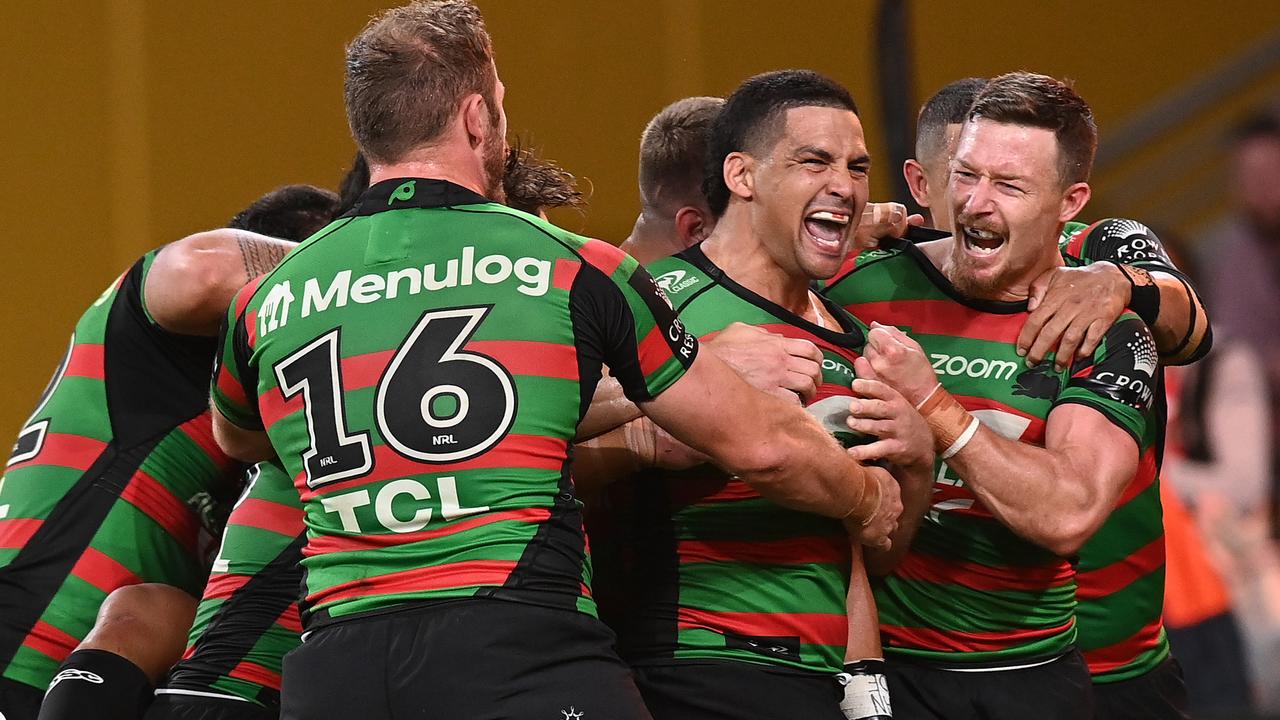
The only other time Scott has heard his father sing the song publicly was at a grand final lunch on the Friday before the 2014 premiership.
He was in better health then and he was on stage being interviewed when, from nowhere, he broke into the song.
Who knows why. The effect, though, was instant and overwhelming.
The old Rabbitohs in the room were soon on their feet, with him, singing along.
“He had the whole room with him,” Scott says.
“We’ve got six hefty forwards and seven greasy backs,
“And plenty Souths barrackers, to keep the bludgers back.
“When the skin and hair is flying and the slaughter has begun,
“Three cheers for the good old Rabbitohs, for the victory we have won.”
THE EVOLUTION OF RUGBY LEAGUE’S NO.1s
Tom Trbojevic is the popular pick to win Monday night’s Dally M Player of the Year in spite of the considerable handicap of having played only 15 regular season games.
Normally, such an impost would be equivalent to trying to win The Masters with a wooden spoon for a driver, winning Bathurst in a Camry hire car, or getting a Melbourne Cup winner home you only just discovered was a Ray Thomas tip.
Trbojevic is giving some rivals as much as nine games start in a season where nothing but a shower stall has seemed able to slow him.
In the unlikeliest of ceremonies, Monday’s winner could be the unlikeliest of winners.
Trbojevic is the poster child of a revolution and an evolution taking place in the game, one where the fullback is fast emerging as the game’s most important player.
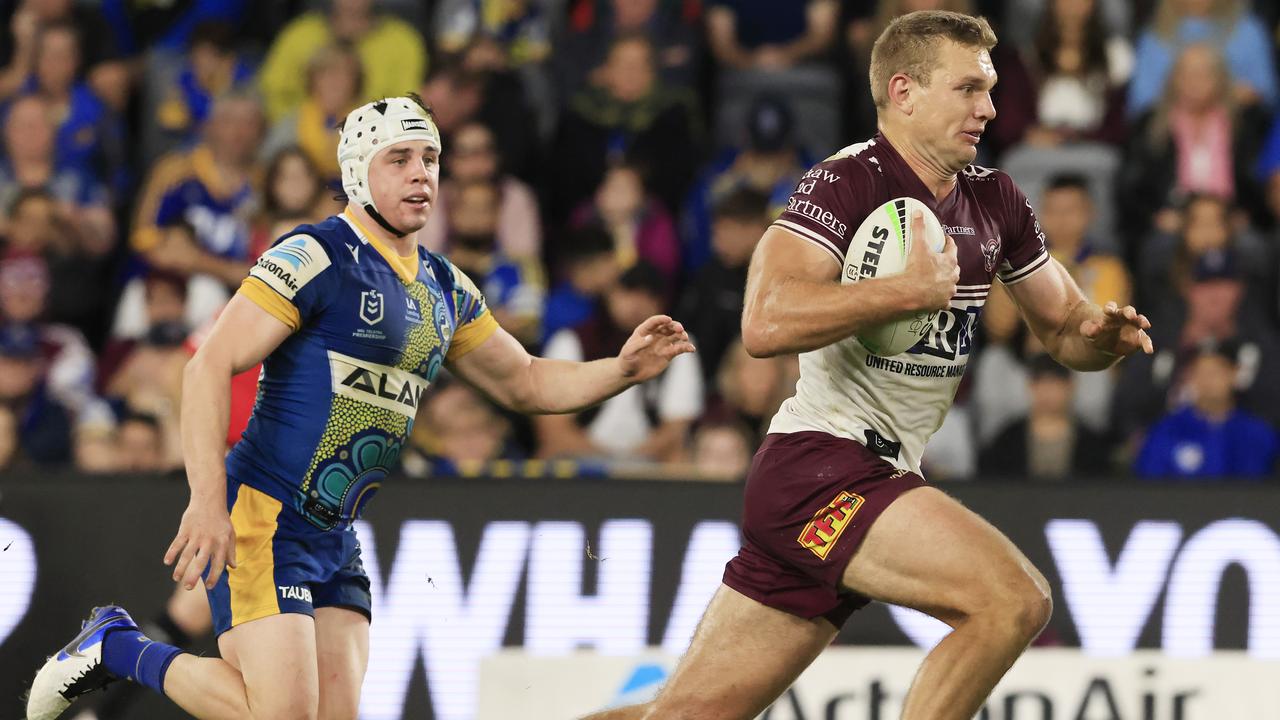
If it continues at this rate, an exponential rise that now sees Trbojevic, at 194cm and 102kg, as the prototype for the modern No.1, it will be just a matter of time before fullbacks are pulling train carriages and standing eye-to-eye with giraffes.
All this is not supposed to come in one package but, better than that, the Sea Eagles have figured out how to use it.
Already there are signs Kalyn Ponga and Latrell Mitchell have taken a page from the Trbojevic blueprint and, by the season’s end, were crashing through the ruck on the tough run to create a whole new headache for middle forwards.
Dispirin doesn’t seem to fix it.
James Tedesco is slightly different through the middle but equally damaging. Where Trbojevic uses his speed and big body to crash through, Tedesco does it with speed and footwork.
Their influence this season has made the fullback close to the most important position in the game, something which was not always true.
Recent rule changes have created another evolution in the game and it is the fullbacks who have prospered most.
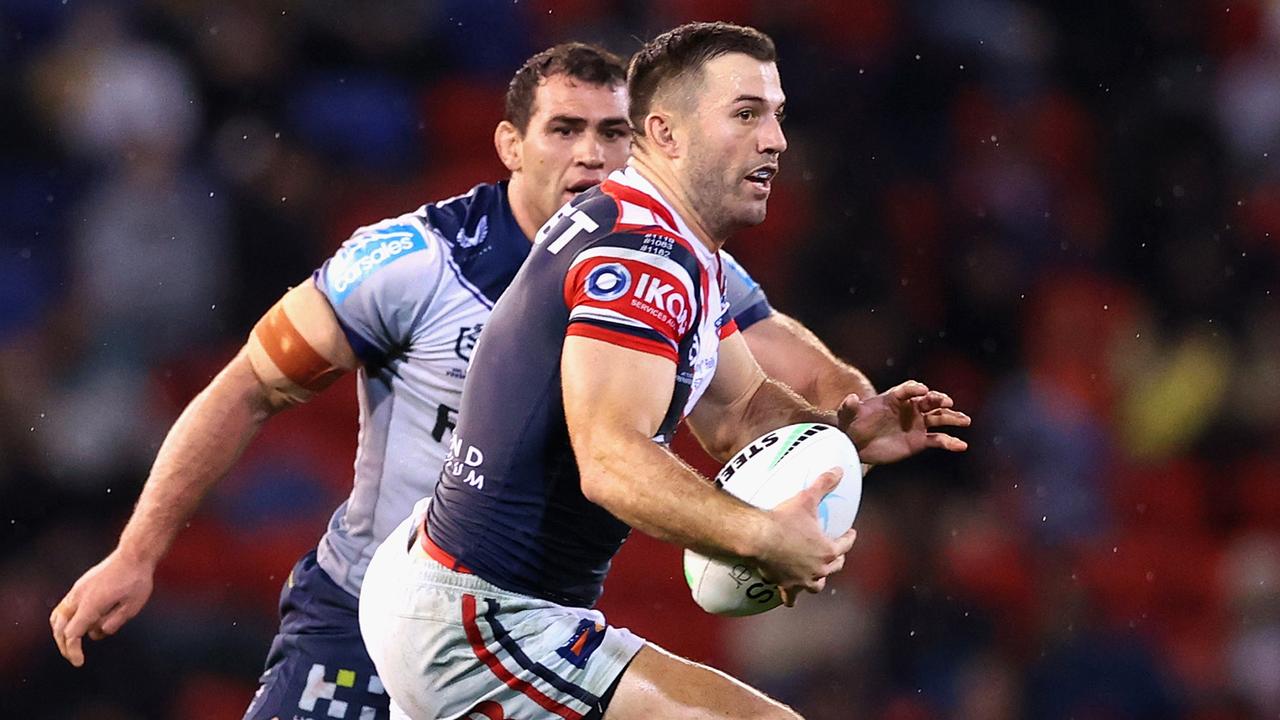
There is always something quietly magnificent about those who come along and change the game. They bring eyeballs to the game that were not there before and, for those already there, they change the way they look at it.
Every position changes with even subtle changes to the rules and right now the fullbacks are driving it.
And the brilliant ones change it forever.
Clive Churchill was the first fullback to really change the way the game was played. It began when Churchill, from the coalfields of Newcastle, did something novel and began to run the ball once he caught it.
Rugby league had a shocking hangover from rugby union before Churchill. Most fullbacks were basically the equivalent of NFL punters, there to hoist the ball back and engage in long, boring kicking duels.
Maybe a little defence on the side, but never too much.
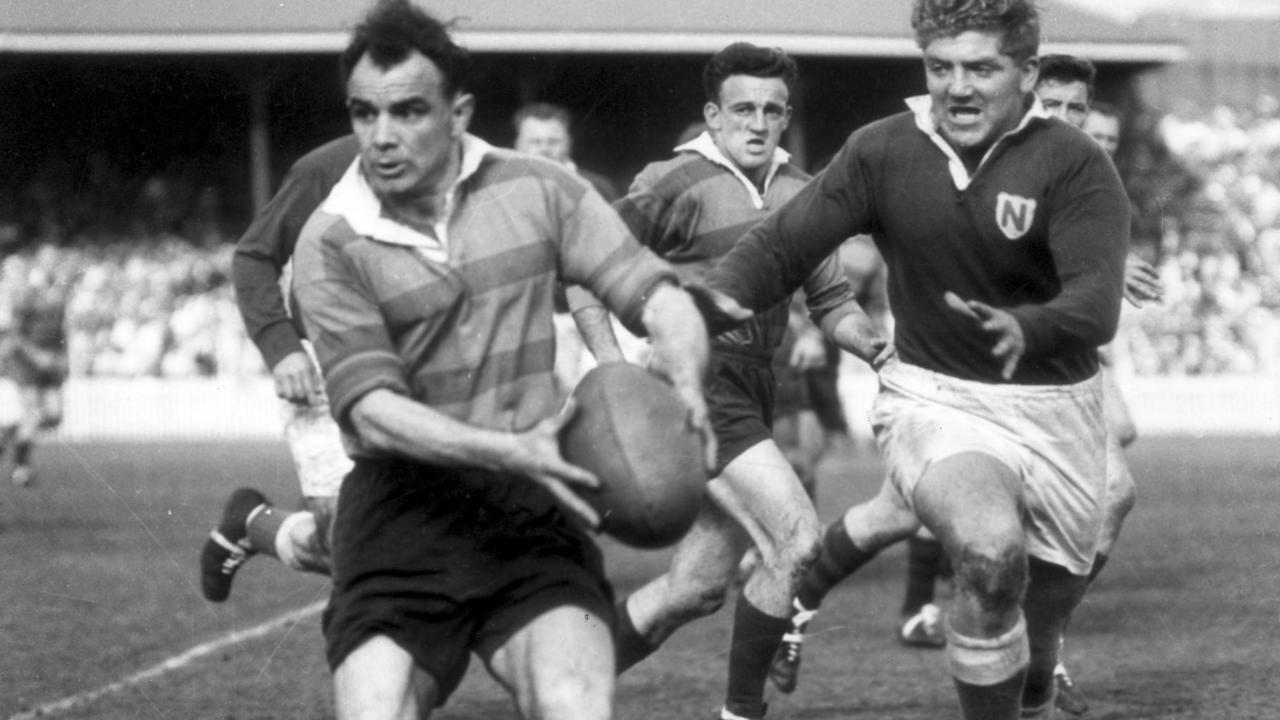
Churchill was tough and honest and brilliant and, once he began to run the ball, every team had no choice but to quickly find a fullback who could do the same. Otherwise Souths had all the advantage.
Some great fullbacks have come along since, each leaving their mark in their own way.
Graeme Langlands was an uncommon combination of toughness and speed; Graham Eadie brought blunt force trauma; Garry Jack was as dependable as bank interest, bringing an emphasis to defence; Darren Lockyer began to glide across the field, skipping outside defenders …
All added a little here and a little there, until Billy Slater revolutionised it again.
Slater’s revolution was forced by change.
As the game modernised, halves stopped playing together and instead began habitating strictly on their edge, like their centres already did, and to stop from overtaxing their players coaches eventually sliced the whole game up that way.
They pushed the two second-rowers to an edge and turned the lock, who in most teams, until then, had always played short sides, into the middle as an extra prop.
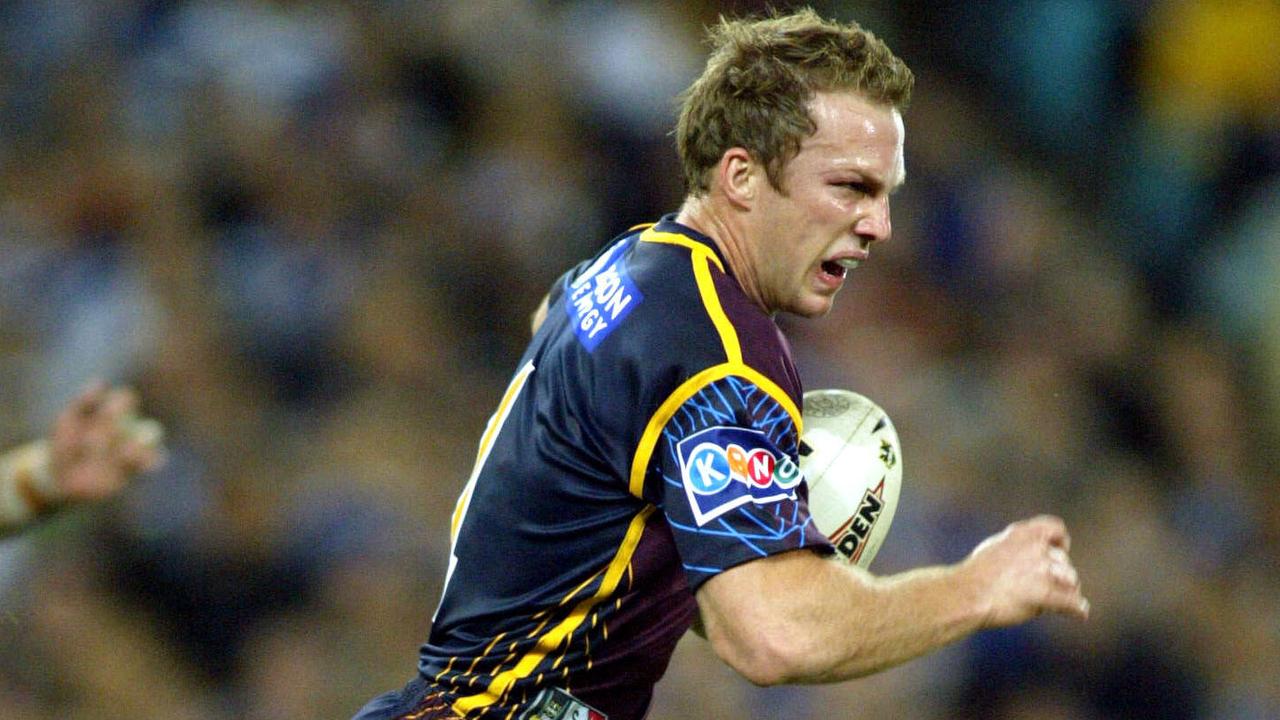
The tremendous structure brought greater consistency to the attack, which pleased the coaches like nothing else. They could see the fruits of their coaching clearer than ever before.
Problem was, because everybody was in their place in attack, and behaving accordingly, the defence also knew where they would be so inevitably it became easier to defend.
The only player left on the field to swing about and create the extra man in attack was the fullback, who became crucial.
He was the only player not locked into place.
Slater soon became the master at it.
Soon, though, teams began finding Slater and nominating him, a defender jumping out of the line to shut him down. So he developed a pass.
He was now playing, in the old-fashioned sense, like a running five-eighth.
The next evolution was smaller and happened when Victor Radley went down with injury some years back.
By now, locks were going through their own evolution and evolving from small props, there for hit-up three, to ball-players once again, although this time in the middle, and the likes of Radley and Cameron Murray excelled.
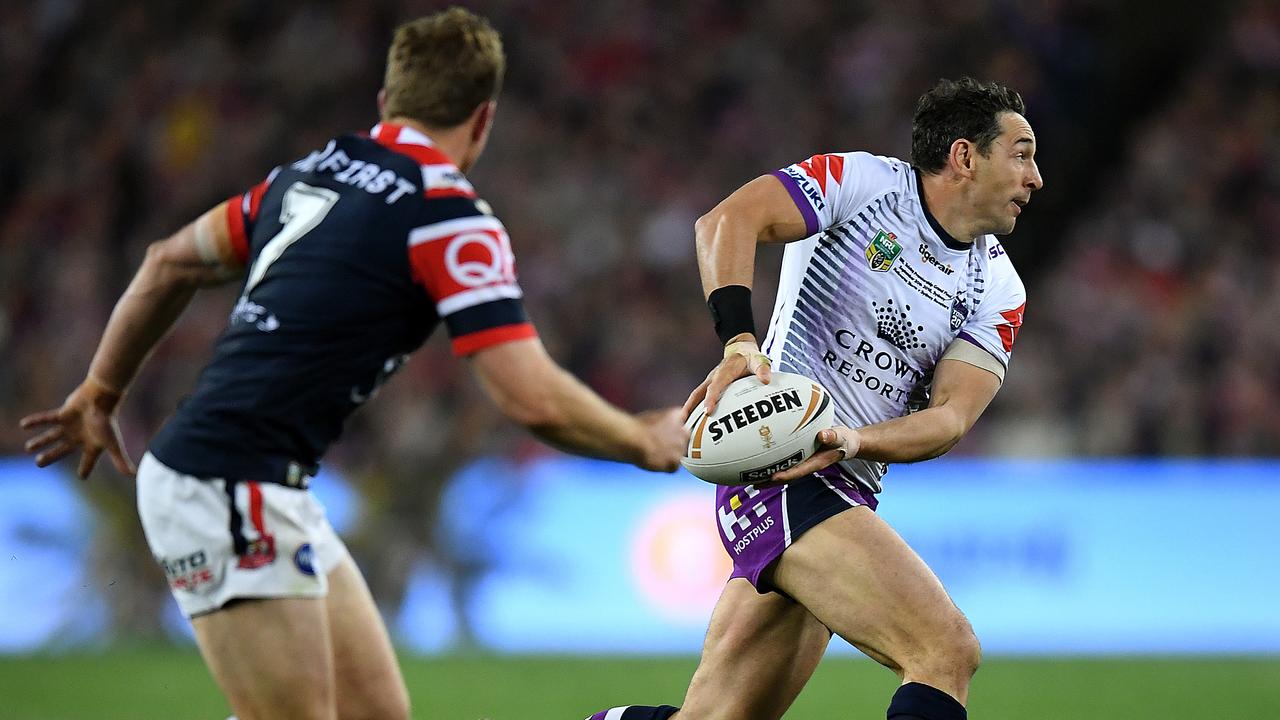
When Radley went down with injury, James Tedesco stuck his hand up and volunteered to take over the ball-playing role in the middle, something he took to new levels again this season when Luke Keary and any number of Roosters halves saw time on the sideline.
Where Slater tore edge defences apart Trbojevic and Tedesco have moved the threat to the middle of the field as well, simply because they are too much footballer for most teams to defend against.
It’s a revolution begun by Churchill, running the ball, that continues to this day.
And thankfully it was the right revolution to catch on at the time.
The other one, well, when the great French fullback Puig Aubert toured Australia in the 1950s, and when Churchill was the Kangaroos standout on the other side, fans were stunned when they saw Aubert refuse to tackle.
To the point that when the Aussies broke through and set sail for the try line he would stand his ground, or sometimes lean against a goalpost, and let them pass by to score.
Aubert argued that if the 12 men in front of him failed to do their job and stop the ball runner then why should he?
It had a certain logic to it.
More Coverage
Originally published as Paul Kent: Brash Panthers out to fracture Rabbitohs’ fairytale in NRL Grand Final









